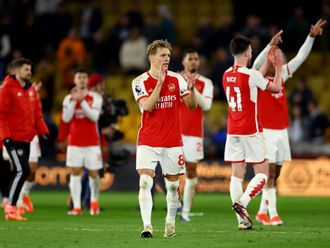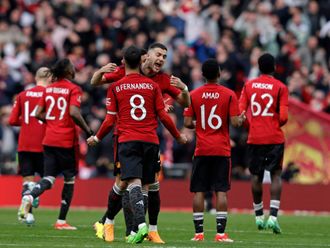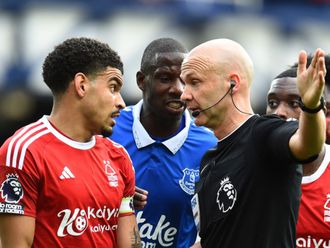New York: When Lionel Messi collected a record fourth Fifa World Player of the Year award last month, among the dignitaries applauding the Barcelona player’s historic achievement was the President of the United States Soccer Federation, Sunil Gulati.
The man credited with the vision and drive to take Major League Soccer to the next level in a country dominated by NFL football, NBA basketball, baseball and ice hockey, has earned huge respect for his efforts not only in the US, but also from the world’s football federations. Back in New York, a matter of days after the Fifa awards, Gulati spoke exclusively to Gulf News and revealed that, despite the growth and popularity of MLS, his federation’s ambitions remain high.
He said: “We started a league from scratch. If you look at where we were in 1996, 17 years later we have 19 teams in two countries, averaging 18,000 people a game. There aren’t many leagues in the world that are averaging 18,000 people a game.
“Most of the teams have built soccer-specific stadiums. Seattle has 40,000 people at every game. Portland is sold out every game, with a long season ticket waiting list. So there are some pretty extraordinary things going on, but it doesn’t happen overnight, it’s not where we want to be. It’s not the Premier League yet.”
India-born Gulati, who was delighted to see Abby Wambach crowned Fifa Women’s World Player of the year in Zurich, with compatriot Alex Morgan runner-up, added: “Our women’s team has medalled in every tournament they’ve ever played in. Our U20s won the World Cup on the women’s side. Our men have qualified for six straight World Cups, got to the second round three times and the quarter-finals once.”
Looking out from his neat and tidy office at New York’s Columbia University, the gathering clouds outside cannot detract from the natural enthusiasm and warm personal flair that Gulati exudes for football. But he accepts that, despite a huge fan base and multiple television channel coverage, ratings for MLS continue to present a challenge, as does the challenge of inclusivity.
Gulati served as USSF executive vice-president for six years, and it came as no surprise when he was successfully elected as its president in 2006. Combining his presidency with the parallel role as senior economics lecturer at Columbia University, Gulati explained that previous USSF president incumbents have been a doctor, a lawyer, and a builder. In a time when sports revenue generation is key, perhaps the need for a president with an economics background is more of a natural fit than one would have initially thought.
At heart he is, however, a fan of the game, and speaks passionately about the MLS enhancement that star names such as David Beckham and Thierry Henry have brought to North America.
“No question about it!” he enthuses of the pair’s impact. “From day one, the league has always had a business plan of the mix of the players we’d like: American players, exciting players from other parts of the world, some experienced veterans and players such as David Beckham in particular bring something completely different. Right?
“Thierry Henry, and named players who bring a fan base and awareness that’s from around the world and bring recognition with their league. So when David is still a cultural and football icon, it’s pretty extraordinary the interest people have in him as a person and as a player. That’s helpful for the league,” stressed Gulati.
He would not be drawn on whether Chelsea’s midfield star Frank Lampard could be the next Premier League star to switch to the MLS.
“I have no idea about him specifically. There are a lot of players out there that would be good for the MLS. He’s obviously a very talented player with a lot of name recognition.”
The relationship between the USSF and the English FA, remains amiable. Previous talk of playing a round of EPL games abroad was mooted several years ago and, should all the governing bodies agree, may yet take place. That is something that the USSF would be willing to consider, says Gulati, but stresses only if those conditions are met.
“We would only look at it and consider it if Fifa and Concacaf and the other authorities did. And frankly that hasn’t been raised in the last few years. It was raised four or five years ago now. I’ve seen [English FA Chairman] David Bernstein and [EPL Chief Executive] Richard Scudamore a number of times since then, but that’s not been raised since it was discussed some years ago.
“If the Premier League wants to raise that, and the governing bodies would look at, that’s something that we would look at, and at any proposal. There’s a lot of things that might happen with teams playing their home games abroad and so on,” he points out, with NFL and NBA teams now playing some “home” games overseas.
World Cup
Having staged a very successful World Cup in 1994, Gulati and the USFF had high hopes that a bid for the 2022 World Cup would prove successful.
Despite the backing of US President Barack Obama, the bid lost out to Qatar. “Fifa got it wrong,” President Obama would later say.
“I’m not shocked that it didn’t happen,” sighs Gulati. “This was an election, I made that very clear to our team. This wasn’t just a technical description and put it in a computer programme. This was an election. President Obama has been part of many elections, he’s been pretty successful at his, and I know he made that comment. He was very disappointed, as were we.
“It was obviously a disappointing day for us, we worked very hard and we think we put together a great bid. But I wouldn’t say I was shocked by it, given that we had been talking to a lot of people. Qatar put together an impressive bid and we accept the results.
“It’s clear that bidding for these sort of events has become a competition at that level now, it’s nation states that are involved, and that’s very tricky for a country like the US. We’re not in a position where we can meet some of the requirements instantly because of American law. So you can’t do things about waiving taxes or changing immigration policy overnight. That doesn’t happen in a country like the US,” notes Gulati, who nevertheless declares his intention to work towards seeing the US host a future World Cup.
Gulati was born in India and came to America with his mother as a five-year-old to be re-united with his father, who had set off earlier to complete a PhD in statistics in Connecticut. The absence gap from the country of his birth may have increased, but he insists those early memories of India have anything but faded.
Fond memories
“I have fond memories of my grandmother, in Punjab, and little incidents along the way that stick with you. I went back eight or nine years ago. It was the first time with my wife and son. That was a great experience for them to be able to meet some of their relatives and see a little bit of the country, and also do some of the touristy things that are so extraordinary about India.”
With a higher profile on the world football stage, and given Fifa’s avowed commitment on inclusivity in the game, it may not be beyond the realms of possibility to see Gulati in a higher role in world football. Would he entertain the thought of running for the role of Fifa president one day, I enquire? “I am focused on making US Soccer successful,” comes his reply.
Perhaps a diplomatic career could also beckon.











